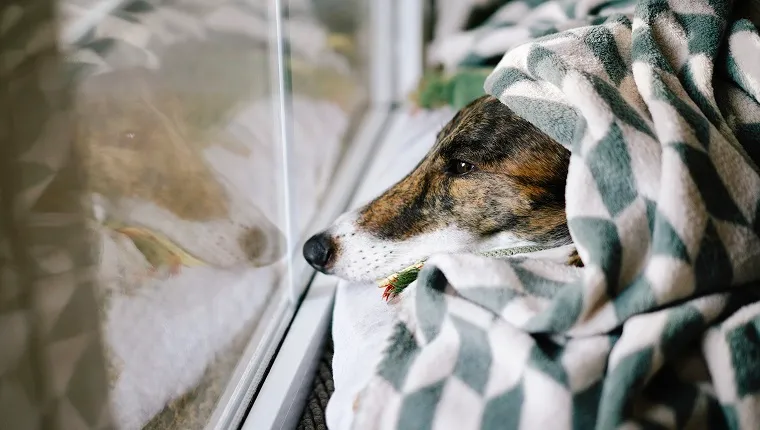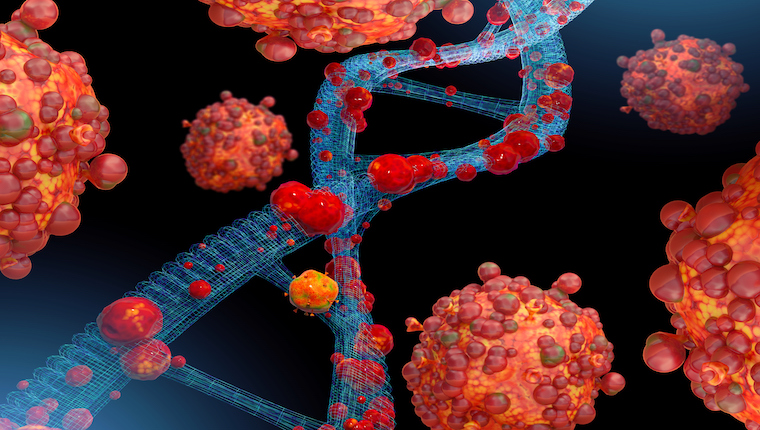
Researchers think that a Greyhound diagnosed with Monkeypox is the first case of the disease that humans have transmitted to pets.
The 4-year-old Italian Greyhound tested positive in June, two weeks after the dog’s parents were diagnosed with Monkeypox at a hospital in Paris, reported the Lancet, adding that the human monkeypox virus is spreading in Europe and the USA among individuals who have not traveled to endemic areas. (An endemic disease is constantly present in a particular area. Monkeypox is a rare tropical disease that wild animals spread in West Africa).
According to the report, the Greyhound’s parents said that they let their dog sleep in bed with them. They said they had been careful to keep their pet away from other animals or humans from the start of their own symptoms — before the dog’s symptoms started.
Transmission of the Virus
“To the best of our knowledge, the kinetics of symptom onset in both patients and, subsequently, in their dog, suggest human-to-dog transmission of monkeypox virus,” the Lancet authors wrote. “Given the dog’s skin and mucosal lesions as well as the positive monkeypox virus PCR results from anal and oral swabs, we hypothesize a real canine disease, not a simple carriage of the virus by close contact with humans or airborne transmission (or both).”
The World Health Organisation (WHO) declared it a global health emergency. More than 80 countries reported cases of monkeypox as of August 12. Dr. Rosamund Lewis, technical lead on the monkeypox response for WHO, said, “The messaging that has been given up until now is that pets should be isolated from the family members who may be infected,” as reported by CNN, “This has been an example of precautionary approach, precautionary messaging, because we didn’t have the information that this had ever happened before, it had not been reported before, but it was a reasonable, cautious message to give. And now we have the first incident where this has actually occurred.”
Lewis said it isn’t clear whether the infected dog will be able to transmit the virus back to humans. “This is an example where most pets will not be at risk, it may only be those who are actually in the household of someone who’s infected,” she said.
Monkeypox Symptoms
In humans, this mild viral infection has a six-to-16 day incubation period. The first symptoms are fever, headaches, swellings, back pain, aching muscles, and a general listlessness in its opening stages. Once that passes and the fever breaks, the sufferer will experience a skin eruption. Here, a rash spreads across the face, followed by the rest of the body. Most commonly, it appears on the palms of the hands and soles of the feet. The blemishes evolve from lesions into crusted blisters, which can then take three weeks to heal and disappear.
The CDC recently updated its page on monkeypox in animals to add that dogs can be infected with the virus. It states that the Monkeypox virus can be found in the rash caused by monkeypox and infected bodily fluids. This includes respiratory secretions, and potentially urine and feces. The CDC notes that pets who had close contact with someone with monkeypox symptoms should remain at home. Meanwhile, they should stay away from other animals and people too. This should be for 21 days after the most recent contact. As well, infected animals can spread the virus to people. It’s “possible that people who are infected can spread Monkeypox virus to animals through close contact, including petting, cuddling, hugging, kissing, licking, sharing sleeping areas, and sharing food”.
So, for pets exposed to monkeypox the CDC advises:
- Do not surrender, euthanize, or abandon pets just because of a potential exposure to Monkeypox virus
- Do not wipe or bathe your pet with chemical disinfectants, alcohol, or hydrogen peroxide. Avoid other products, such as hand sanitizer, counter-cleaning wipes, or other industrial or surface cleaners, too.
- If the person with monkeypox did NOT have close contact with pets after symptom onset, ask friends or family members who live in a separate home to be the animal’s caretaker until the person with monkeypox fully recovers. Close contact includes petting, cuddling, hugging, kissing, licking, sharing sleeping areas, and sharing food.









